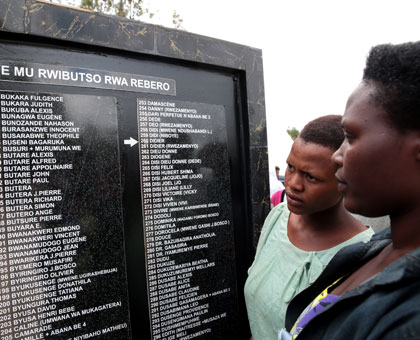Genocide Survivors remain sceptical despite a decision by French judges, last week, that there is prima facie case against two Rwandans living in the European country over their role in the Genocide against the Tutsi.


Genocide Survivors remain sceptical despite a decision by French judges, last week, that there is prima facie case against two Rwandans living in the European country over their role in the Genocide against the Tutsi.
Prima facie is when it is clear that a case can be made out on the evidence available.
Octavien Ngenzi and Tito Barahira are accused of actively participating in the killings of Tutsi refugees hiding in Kabarondo Catholic Church in April 1994. The prosecutor is seeking charges of genocide and crimes against humanity against the two.
It is now up to the judge to set the date of trial for the two men, who are currently remanded.
If the trial goes ahead, it becomes the second on French soil following that of spymaster in the genocidal regime, Pascal Simbikangwa, who was earlier this year sentenced to 25 years in jail.
Alain Gauthier, the president of Collectif des Parties Civiles pour le Rwanda (CPCR), a group that has for years hunted down and taken to court Genocide suspects living on French soil, said they will wait for the trial date.
However, Gauthier is not happy with the fact that the judges chose not to add onto the indictment the charge of conspiracy to commit the Genocide.
"We have 10 days to appeal the partial dismissal,” he said.
Ngenzi, 60, and Barahira, 62, were bourgmestres (mayors) of the former Kabarondo commune now (Kayonza District) between 1977 and 1994.
Prosecutors say this position allowed them to instill hate toward the Tutsi in their administrative territories.
Ngenzi is accused of supervising the killing of over 1,200 people in a church.
Before his arrest in April, last year, Barahira had disguised himself by changing his name to Barahirwa.
The duo fled Rwanda in April 1994.
Like Simbikangwa, Ngenzi was arrested in Mayotte islands in 2010. In 2013, Barahira was arrested in Toulouse, a city in southwestern France.
‘Indifferent Paris’
The CPCR has tracked down and sued 25 such suspects in France, but Paris remains accused of indifference.
Evode Kalima, a Genocide survivor and former lawmaker, insists that there is nothing worth celebrating when France holds only its second Genocide trial in 20 years.
"There is hope that Rwandans who fled to that country but had been given heavy sentences by Gacaca courts might be followed up by French courts,” Kalima said.
"We can’t be happy when Fr. Wenceslas Munyeshyaka who was parish priest of Kigali’s St. Famille Church in April 1994, isn’t yet taken to court, especially as he is among the first Rwandans to be given a safe haven by France yet he was wanted by the International Criminal Tribunal for Rwanda.”
Kalima warned that people must not forget that Simbikangwa’s trial never really ended since he appealed.
"Up to now, there has been no real tangible outcome and thus, we really cannot be complacent.”
The CPCR believes a positive momentum was engineered in 2012 when a special unit comprising judges was created in the Tribunal de Grande Instance of Paris to investigate cases of Rwandans implicated in the Genocide.
Last week, CPCR filed a fresh case against Félicien Baligira, who is accused of masterminding the death of more than 6,000 people at a Catholic church in the former Cyangugu Prefecture in 1994.


